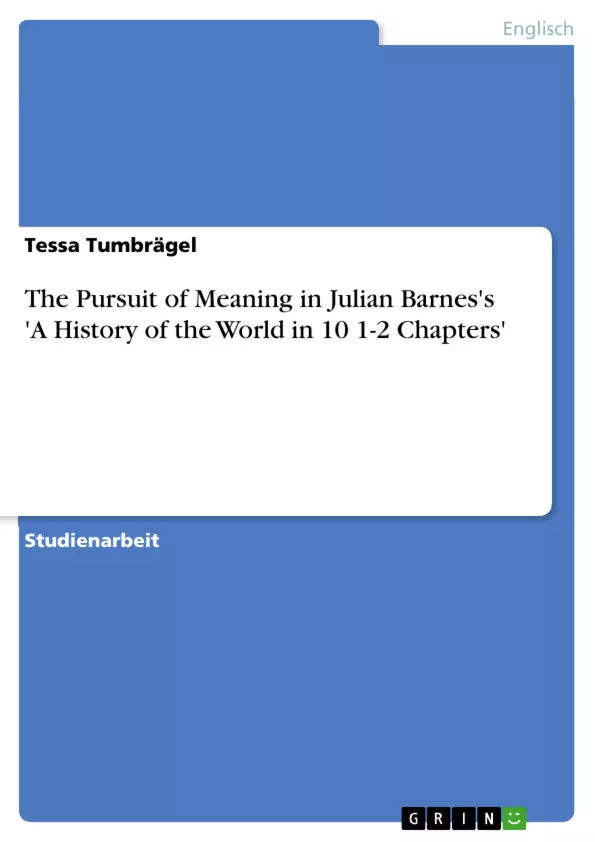To the new generation of postmodern writers, particularly from the western hemisphere, the idea of „meaning‟ and „essential truth‟ is a relict from the past, an old-fashioned and embarrassing concept that has no validity in a heterogeneous world. In postmodern times, the notion of „meaning‟ has become questionable, even contestable. There reigns a deep-rooted distrust of any „big idea‟ which presumes to account for an overall representation of life disregarding its heterogeneity. Hence, the metaphysical systems of the “grand narratives” (Wakefield 1990: 22) of the pre-postmodernist era can no longer be accepted as final authorities for the sovereignty of interpretation.
In my term paper, however, I a m going to demonstrate that the idea of meaning and its pursuit is not dead in Julian Barnes‟s fifth novel A History of the World in 10 ½ Chapters (HW). Although it is often - and in my view unjustly- referred to as a perfect example of postmodern fiction, the novel rather plays with postmodern philosophies and frequently questions them without ever constructing certainties. This is especially true in relation to Barnes concept of history, the main theme of the novel. In fact, it is a rather depressing concept since history is portrayed as an arbitrary collection of stories which “are put together in the same ways that novelists use to put together figments of their imaginations to display an ordered world, a cosmos, where only disorder or chaos might appear” (White 1978: 125). In this manner, the author subtly unsettles our common imaginations of history and historiography and demonstrates that, in the end, everything is largely fictional.
Confronted, however, with the postmodern scepticism of knowledge and values, Barnes does not deny the human longing for patterns of order and stable contexts of reference. This undeniably schizophrenic or at least inconsistent attitude of the notion of meaning will be further analyzed throughout my term paper. First of all, I am going to have a closer look on Barnes‟s relationship towards the postmodern crisis of meaning and, with regard to that, his concept of history epitomized in A History of the World
- 2 -
in 10 ½ Chapters. Subsequently, I will then examine its implications on the pursuit of meaning and its metamorphoses – the search for religion, art and love – and investigate how they are used as means against the cruelty of history.
Inhaltsverzeichnis
- 1. INTRODUCTION
- 2. BARNES AND THE POSTMODERN CRISIS OF MEANING
- 3. HISTORY AND MEANING IN A HISTORY OF THE WORLD IN 10 ½ CHAPTERS
- 3.1 "SOOTHING FABULATION" - BARNES' CONCEPT OF HISTORY
- 3.1.1 HISTORY BETWEEN MYTH AND CATASTROPHE
- 3.1 "SOOTHING FABULATION" - BARNES' CONCEPT OF HISTORY
Zielsetzung und Themenschwerpunkte
Diese Arbeit untersucht Julian Barnes' Roman „A History of the World in 10 ½ Chapters“ im Kontext der postmodernen Krise der Bedeutung. Das Hauptziel ist es, Barnes' Verhältnis zum Postmodernismus und seine Konzeption von Geschichte zu analysieren, sowie die Rolle von Religion, Kunst und Liebe als Gegenmittel zur vermeintlichen Sinnlosigkeit der Geschichte zu beleuchten.
- Postmoderne Krise der Bedeutung und ihre Auswirkungen auf Literatur
- Barnes' Konzeption von Geschichte als "soothing fabulation"
- Die Rolle von Religion, Kunst und Liebe als Strategien des Sinn-Suchens
- Historiografische Metafiktion und die Dekonstruktion der historischen Objektivität
- Ambivalente Haltung Barnes' gegenüber postmodernem Denken
Zusammenfassung der Kapitel
Kapitel 1 (Introduction) führt in die Thematik ein und stellt die zentrale Frage nach der Bedeutung im Werk Barnes'. Kapitel 2 (Barnes and the Postmodern Crisis of Meaning) analysiert den Postmodernismus und dessen Einfluss auf Barnes' Werk. Kapitel 3 (History and Meaning in A History of the World in 10 ½ Chapters) untersucht Barnes' Geschichtsauffassung und die Bedeutung von "soothing fabulation" im Roman. Es wird außerdem der erste Teil von Kapitel 3.1 ("Soothing Fabulation" - Barnes' Concept of History) behandelt, welcher die Verknüpfung von Geschichte, Mythos und Katastrophen im Roman untersucht und den Aspekt der "maritimen Katastrophen" als wichtiges Leitmotiv hervorhebt. Die weiteren Kapitel werden in dieser Vorschau nicht zusammengefasst, um Spoiler zu vermeiden.
Schlüsselwörter
Postmodernismus, Julian Barnes, A History of the World in 10 ½ Chapters, Historiografische Metafiktion, Bedeutung, Geschichte, Sinn, Religion, Kunst, Liebe, Soothing Fabulation, Mythos, Katastrophe.
Häufig gestellte Fragen
Wie sieht Julian Barnes Geschichte in seinem Roman?
Barnes porträtiert Geschichte als „soothing fabulation“ – eine willkürliche Sammlung von Erzählungen, die Ordnung in ein eigentlich chaotisches Geschehen bringen.
Ist die Suche nach Sinn im Postmodernismus tot?
Die Arbeit zeigt, dass Barnes trotz postmoderner Skepsis das menschliche Verlangen nach Mustern, Ordnung und stabilen Kontexten nicht leugnet.
Was ist historiografische Metafiktion?
Ein literarischer Stil, der historische Fakten mit Fiktion vermischt und dabei die Konstruiertheit von Geschichtsschreibung selbst thematisiert.
Welche Rolle spielen Kunst und Liebe im Roman?
Sie fungieren als Metamorphosen der Sinnsuche und als Gegenmittel zur Grausamkeit und Willkür der Geschichte.
Warum ist der Roman ein Beispiel für postmoderne Philosophie?
Er spielt mit dem Misstrauen gegenüber „großen Erzählungen“ und dekonstruiert die Idee einer objektiven historischen Wahrheit.
- Citation du texte
- Tessa Tumbrägel (Auteur), 2012, The Pursuit of Meaning in Julian Barnes's 'A History of the World in 10 1-2 Chapters', Munich, GRIN Verlag, https://www.grin.com/document/187665



